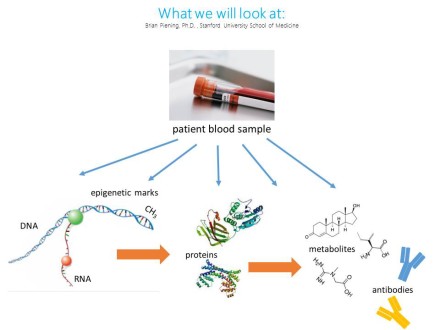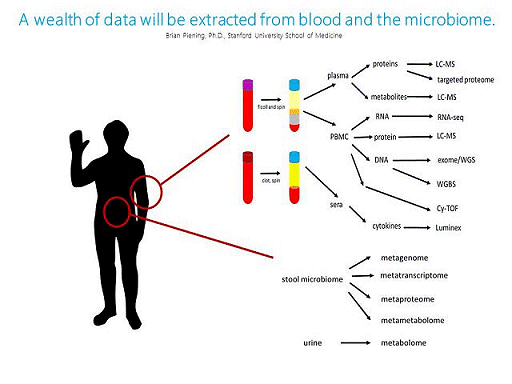As part of the Open Medicine Foundation End ME / CFS Project, this study will conduct a comprehensive, “Big Data” analysis on severely ill ME / CFS patients with the goal of finding sensitive and distinctive molecular biomarker(s). The molecular biomarkers that reflect the symptom mechanism are expected to be strongest in the approximately 25% of ME / CFS patients who have a severe form of the disease and are home-bound or bedbound.
Although many of the symptoms are neurological, neurological diseases often produce molecular biomarker(s) that may be found in the blood, saliva, sweat, urine and feces. Identifying biomarker(s) in these easily assayed fluids can be convenient, inexpensive and can be conducted on bedbound patients. Such an easy and distinguishing test is more likely to be diagnostically useful in the clinical setting.
The source of the potential diagnostic biomarker(s) is not immediately obvious; it could be in the DNA, RNA, proteins, carbohydrates or metabolites, or could be from an associated microbe in or on the body.
 Other benefits of this study:
Other benefits of this study:
In addition to increasing the accuracy of diagnosing ME / CFS, a distinctive biomarker that correlates with symptom severity could reveal the disease structure or mechanism. So the second phase of this study will aim to test the discovered biomarkers in the less severely ill to see if they are present but possibly not as strong. Discovering biomarkers that go up or down with symptom severity will provide targets for treatment trials. Additionally, treatment trials can also reveal more about the disease mechanism.
How this study is different:
Many previous studies look for one thing or test only one biological area in a group of patients. Discovering a mixed biomarker set from different body systems would require that all of the analysis be conducted on the same patient, instead of piecemeal studies on different patients in different studies.
Such a comprehensive analysis may reveal how the different systems malfunction at the same time and possibly together contribute to the disease mechanism. A comprehensive biological analysis in each patient in the study could also reveal that different mechanisms in different patients lead to the same symptoms. Finding different biomarkers in different patients would identify subgroups that can then also be subjects for targeted treatment trials.
What is needed:
Conducting all of these molecular investigations with state-of-the-art methodologies on well-described patients will be a daunting task. It will require significant resources and considerable coordination and cooperation within the scientific and medical communities. For the first phase of this study, our goal was to raise $1 million. Gaining the extensive data set will require $50,000 per patient for logistics and supplies.
As of August 28, 2015, this Phase I was fully funded. Phase II will research whether these biological abnormalities identified in Phase I are also present in the less severely ill and if they are or are not present in other diseases. Please help us fund Phase II and take the next step in Ending ME / CFS.
Read a detailed description of the study, including the specific tests that are included.
Update Spring 2018:
Severely Ill Big Data Study – This study, led by Ronald W. Davis, PhD, and Wenzhong Xiao, PhD, included over 1,000 tests per patient, producing, to our knowledge, the biggest dataset ever generated in a cohort of ME / CFS patients. This big data study examined the patients’ genome, gene expression, metabolomics, microbiome, cell-free DNA sequencing and quantitation, and cytokines, as well as a range of tests typically performed by clinicians. In 2017, the focus of the study was on analysis, data integration, and making the dataset available to researchers at The Stanford End ME / CFS Data Center (registration required). Click here to read more about the objectives and types of data gathered in this study.
 Differences in metabolites, microbiomes, cytokines, and several clinical test results were observed between patients and controls.
Differences in metabolites, microbiomes, cytokines, and several clinical test results were observed between patients and controls.- No significant differences were found for any major DNA viruses between patients and controls using cell-free DNA from the blood. By using cell-free DNA it was possible to look for even the viruses that can hide behind the blood-brain barrier escaping detection by normal means. In addition, the blood of patients was examined for new pathogens by isolating particles from the blood and using DNA sequencing. No new pathogens were found.
- SF-36 scores are worse in ME / CFS than in several other major diseases and correlate the least with depression and mental illnesses.
- Genetics have been a particularly interesting aspect of this study, as the team has identified several candidate genes that may predispose individuals to develop ME / CFS (or severe ME / CFS). This is exciting because it may tell us about the root cause of the disease – which still remains a mystery.
- Amping up the analysis is a priority given the complexity of this dataset. OMF has funded a full-time bioinformatician at the Stanford Genome Technology Center to help complete the analysis of this dataset and publish it in the scientific literature, and to continue integrating it with future projects.



